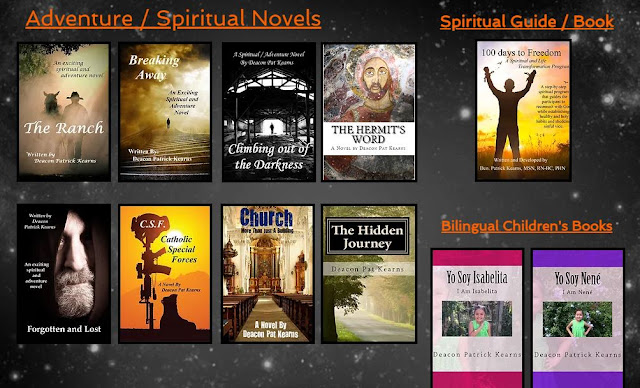Homily on John
16:12–15 – Living in the Heart of the Trinity
Today’s Gospel, from John brings us
into the mystery of God Himself.
Jesus says to His disciples:
“I have much more to tell you, but you
cannot bear it now.
But when He comes, the Spirit of
truth, He will guide you to all truth.”
It is no coincidence that this passage
is often proclaimed as we celebrate Trinity Sunday, the solemn feast of
our God—Father, Son, and Holy Spirit.
This is not just a mystery to admire
from a distance—it is the very life and love of God that we are invited into.
Let’s begin with the heart of the
Trinity: relationship.
God is not a solitary being, distant
and aloof.
God is a communion of persons:
the Father who loves,
the Son who is loved and returns that
love,
and the Holy Spirit, who is the very
bond of that love.
One God, three Divine Persons,
eternally united.
Jesus says in today’s Gospel:
“Everything that the Father has is
mine; for this reason I told you that He [the Holy Spirit] will take from what
is mine and declare it to you.”
There is no competition in the
Trinity.
No division.
No selfishness.
Only complete self-giving and sharing.
Each Person gives Himself totally to
the other.
This is not a theological
abstraction—it is the very nature of God.
Now, here’s the amazing part:
you and I were made in the image of
this God.
That means we are made for love, for
relationship, for communion—not isolation, not control, not pride.
Let me share a story to help us
understand the Trinty.
There was once a missionary priest
serving in a small African village.
He had spent many months trying to
explain the concept of the Trinity to his catechumens.
He had tried using symbols—the
triangle, the shamrock, the three candles in one light—but the people still
looked puzzled.
One day, he visited a local family.
It was a grandmother, her daughter,
and a small child.
He watched how the grandmother gently
helped the mother with cooking, while the mother taught her little girl to
carry water.
He saw how they laughed, corrected one
another gently, and shared everything—stories, work, even silence.
He suddenly realized: This is the
image.
He gathered the catechumens the next
day and said,
“The Trinity is like that family.
The grandmother, mother, and
daughter—distinct persons, but united by love.
They live for one another, give to one
another, and love as one.
That is what God is like.”
And that day, something clicked.
The people nodded.
They understood.
The Trinity is not a math problem to
solve.
It is a living relationship.
And it’s one we are invited into.
The Trinity,
however, has been Revealed Gradually
Jesus also says in the Gospel:
“I have much more to tell you, but you
cannot bear it now.”
That tells us something important: God
reveals Himself gradually.
In the Old Testament, God revealed
Himself as the One Creator, a loving Father who formed His people.
Then, in the Incarnation, the eternal
Son became flesh—Jesus, fully God and fully man.
After His Resurrection and Ascension,
the Holy Spirit was sent to dwell in the hearts of believers.
Why doesn’t God reveal everything at
once?
Because He meets us where we are.
Like a good teacher, He doesn’t
overwhelm us, but walks with us step by step.
The Holy Spirit, whom Jesus calls the
“Spirit of truth,” continues to guide the Church, to form our consciences, and
to lead us deeper into the mystery of God’s love.
We are still on that journey.
So how do we live this mystery?
How do we let the Trinity shape our
daily lives?
Let me offer three concrete invitations:
1. Pray to the
Trinity
Each time we make the Sign of the
Cross, we say, “In the name of the Father, and of the Son, and of the Holy
Spirit.”
This is not a routine gesture.
It is a declaration of who God is—and
who we are.
We belong to this God. We live in this
love.
Don’t be afraid to pray personally to
each Person of the Trinity.
Thank the Father for creating and
loving you.
Speak to Jesus as your Savior and
friend.
Invite the Holy Spirit to guide your
thoughts and decisions.
2. Seek Unity in
Relationships
The Trinity is a model of perfect
unity.
In a world so divided—by politics,
race, ideology, and even within families—we are called to be witnesses to
divine communion.
That means forgiving quickly, loving
patiently, serving one another, and building bridges instead of walls.
3. Allow the Spirit
to Lead You
Jesus promises that the Spirit will
“guide you to all truth.”
That’s not just theological truth, but
the truth of how to love your spouse, how to raise your children, how to serve
the poor, how to be faithful in your vocation.
Before making a big decision—or even a
small one—say, “Come, Holy Spirit.”
That simple prayer can open your heart to God’s will.
Brothers and sisters, the mystery of
the Trinity is not a puzzle to be solved but a relationship to be lived.
The Father created you in love.
The Son redeemed you through love.
The Holy Spirit fills you with love
and unites you to the very life of God.
This week, live in that relationship.
Pray in that love.
Share that unity with those around
you.
Because the Trinity is not just who
God is—it is who we are called to become.
In the name of the Father, and of the
Son, and of the Holy Spirit.
Amen.




